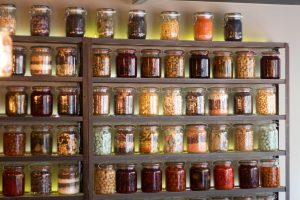Meal planning impacts many aspects of our lives such as household budgeting, spending time together, and eating healthy food. These are the reasons many begin using Plan to Eat, but Constance Ray of Recoverywell.org recently shared a unique perspective that I had never considered — using meal planning as a tool in addiction recovery.
I asked her to share her thoughts here.

Addiction recovery isn’t something that happens overnight. In fact, most people agree that it takes a lifetime of maintenance and work to stay sober. A person struggling with drug or alcohol addiction has to reshape their entire lifestyles in order to prevent falling into old, unhealthy habits that can lead to drug use. Experts often recommend that people instill routines into their days as a way to support sobriety. Within this routine, people can practice various lifestyle choices that facilitate physical, mental, and emotional well-being.
Exercise and Physical Fitness
Exercise is one of the most powerful tools at an addict’s disposal. Daily exercise — even mild activity — supports overall physical and mental health. First, it provides structure for a person’s day. Whether you wake up every morning for a run or plan on hitting the gym after work, it gives you an opportunity to care for yourself, and in the end, you have a reason to shower. Having something that takes up time in your schedule like that is important for addicts, as their free time was previously consumed by thoughts of procuring and using drugs or alcohol.
Furthermore, regular physical activity provides your brain with a surge of dopamine and other happy chemicals such as serotonin, oxytocin, and endorphins. Addiction throws off your brain’s ability to release and detect this important neurotransmitter, but exercise helps restore balance while reducing cravings for the addict’s substance of choice. In fact, there is evidence that aerobic exercise is instrumental in reversing brain damage inflicted by drug or alcohol use.
Nutrition and Meal Planning
Nutrition and exercise go hand in hand. Eating well fuels your body for your workouts, while exercise provides healthy self-esteem that encourages smart meal choices. However, eating whole, fresh foods can do much more for those recovering from addiction. The right nutrition and sufficient hydration are crucial for healing the damage addiction inflicts on the mind and body. As macro and micronutrient deficiencies can lead to symptoms of depression and anxiety, a balanced diet promotes the kind of mindset an addict needs to stay proactive during recovery.
A great way for addicts to instill healthy eating in their new lifestyle is through meal planning or “meal prep.” Meal planning doesn’t just encourage well-balanced meals; it also provides extra structure in an addict’s life. Not having to worry or think about what they are going to eat reduces anxiety and impulsive decisions. Meal planning also helps save money on food and grocery bills, which can facilitate financial recovery from addiction.
Meditation and Mindfulness
With all the activity that goes into adding exercise and meal planning into your schedule, it’s also important to remember the benefits of sitting still. Meditation and mindfulness are powerful tools that help addicts reduce anxiety and negative feelings. While meditation is a helpful exercise that encourages mindfulness, mindfulness itself can be practiced all day, throughout the day, for a happier and more centered life.
Many people find it is easier to implement daily mindfulness if they have a designated space or meditation room where they can remove themselves from external stimuli and concentrate on their breath. To create your own mindful space, pick a place separated from the majority of your household traffic. Some find it helpful to have a view of nature as a focal point, but others are just as comfortable with using a candle or incense burner as a source of focus. No matter where your meditation room is or what it contains, it needs to be clutter-free. Clutter in your environment only encourages a cluttered mind, which is the opposite of meditation’s intention.
Those recovering from addiction can support sobriety through a full-day routine that is structured around healthy lifestyle choices. Exercise balances neurotransmitters while supporting overall mental and physical health. Proper nutrition through meal planning is another helpful tool. Practicing mindfulness and meditation are still counterpoints to exercise and meal prep, but they can be just as helpful for a recovering addict.
Constance Ray started Recoverywell.org with the goal of creating a safe place for people to share how addiction has affected them, whether they are combating it themselves or watching someone they care about work to overcome it. The goal is to share stories of hope from survivors who know that the fight against addiction is one worth having, because no matter how it affects you, life can get better.





